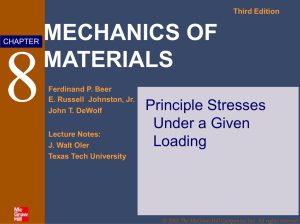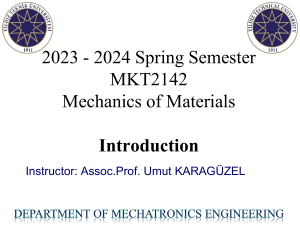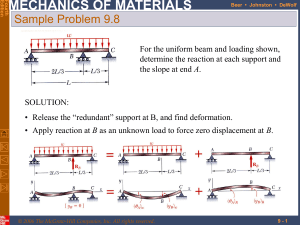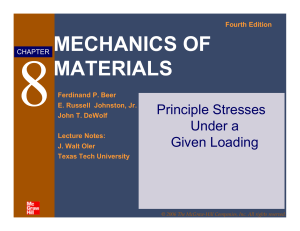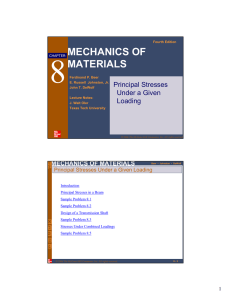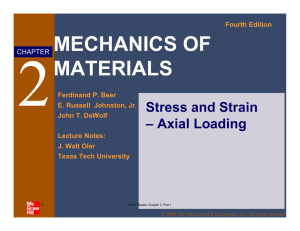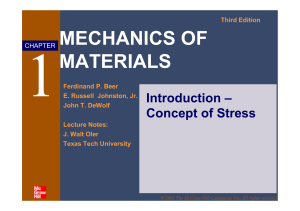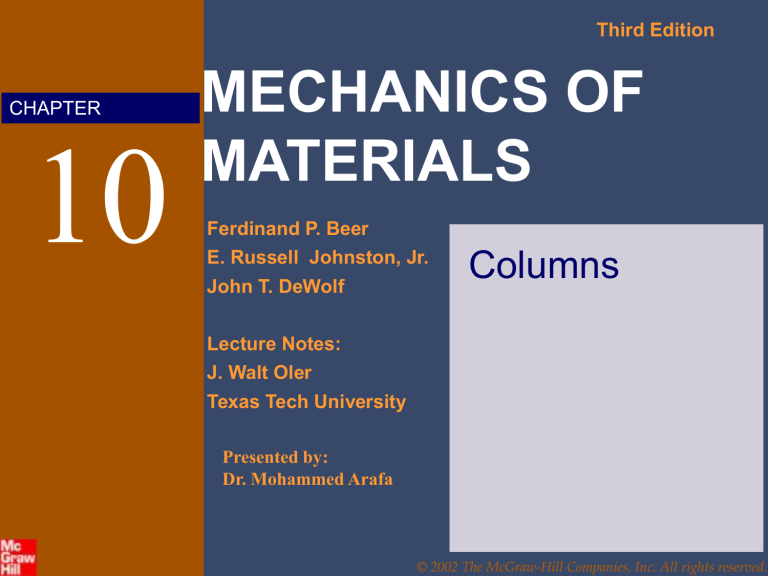
Third Edition
CHAPTER
10
MECHANICS OF
MATERIALS
Ferdinand P. Beer
E. Russell Johnston, Jr.
John T. DeWolf
Columns
Lecture Notes:
J. Walt Oler
Texas Tech University
Presented by:
Dr. Mohammed Arafa
© 2002 The McGraw-Hill Companies, Inc. All rights reserved.
Third
Edition
MECHANICS OF MATERIALS
Beer • Johnston • DeWolf
Columns
Stability of Structures
Euler’s Formula for Pin-Ended Beams
Extension of Euler’s Formula
Sample Problem 10.1
Eccentric Loading; The Secant Formula
Sample Problem 10.2
Design of Columns Under Centric Load
Sample Problem 10.4
Design of Columns Under an Eccentric Load
© 2002 The McGraw-Hill Companies, Inc. All rights reserved.
10 - 2
Third
Edition
MECHANICS OF MATERIALS
Beer • Johnston • DeWolf
Stability of Structures
• In the design of columns, cross-sectional area is
selected such that
- allowable stress is not exceeded
P
all
A
- deformation falls within specifications
PL
spec
AE
• After these design calculations, may discover
that the column is unstable under loading and
that it suddenly becomes sharply curved or
buckles.
© 2002 The McGraw-Hill Companies, Inc. All rights reserved.
10 - 3
Third
Edition
MECHANICS OF MATERIALS
Beer • Johnston • DeWolf
Stability of Structures
• Consider model with two rods and torsional
spring. After a small perturbation,
K 2 restoring moment
L
L
P sin P destabiliz ing moment
2
2
• Column is stable (tends to return to aligned
orientation) if
L
P K 2
2
P Pcr
© 2002 The McGraw-Hill Companies, Inc. All rights reserved.
4K
L
10 - 4
Third
Edition
MECHANICS OF MATERIALS
Beer • Johnston • DeWolf
Stability of Structures
• Assume that a load P is applied. After a
perturbation, the system settles to a new
equilibrium configuration at a finite
deflection angle.
L
P sin K 2
2
PL
P
4 K Pcr sin
• Noting that sin < , the assumed
configuration is only possible if P > Pcr.
© 2002 The McGraw-Hill Companies, Inc. All rights reserved.
10 - 5
Third
Edition
MECHANICS OF MATERIALS
Beer • Johnston • DeWolf
Euler’s Formula for Pin-Ended Beams
• Consider an axially loaded beam.
After a small perturbation, the system
reaches an equilibrium configuration
such that
d2y
M
P
y
2
EI
EI
dx
d2y
P
y0
2
EI
dx
• Solution with assumed configuration
can only be obtained if
P Pcr
2 EI
L2
P
2 E Ar 2
2E
cr
2
A
L A
L r 2
© 2002 The McGraw-Hill Companies, Inc. All rights reserved.
10 - 6
Third
Edition
MECHANICS OF MATERIALS
Beer • Johnston • DeWolf
Euler’s Formula for Pin-Ended Beams
• The value of stress corresponding to
the critical load,
2 EI
P Pcr
cr
L2
P
P
cr cr
A
A
2 E Ar 2
L2 A
2E
L r
2
critical stress
L
slenderness ratio
r
• Preceding analysis is limited to
centric loadings.
© 2002 The McGraw-Hill Companies, Inc. All rights reserved.
10 - 7
Third
Edition
MECHANICS OF MATERIALS
Beer • Johnston • DeWolf
Extension of Euler’s Formula
• A column with one fixed and one free
end, will behave as the upper-half of a
pin-connected column.
• The critical loading is calculated from
Euler’s formula,
Pcr
cr
2 EI
L2e
2E
Le r 2
Le 2 L equivalent length
© 2002 The McGraw-Hill Companies, Inc. All rights reserved.
10 - 8
Third
Edition
MECHANICS OF MATERIALS
Beer • Johnston • DeWolf
Extension of Euler’s Formula
© 2002 The McGraw-Hill Companies, Inc. All rights reserved.
10 - 9
Third
Edition
MECHANICS OF MATERIALS
Beer • Johnston • DeWolf
Sample Problem 10.1
An aluminum column of length L and
rectangular cross-section has a fixed end at B
and supports a centric load at A. Two smooth
and rounded fixed plates restrain end A from
moving in one of the vertical planes of
symmetry but allow it to move in the other
plane.
a) Determine the ratio a/b of the two sides of
the cross-section corresponding to the most
efficient design against buckling.
L = 20 in.
E = 10.1 x 106 psi
b) Design the most efficient cross-section for
the column.
P = 5 kips
FS = 2.5
© 2002 The McGraw-Hill Companies, Inc. All rights reserved.
10 - 10
Third
Edition
MECHANICS OF MATERIALS
Beer • Johnston • DeWolf
Sample Problem 10.1
SOLUTION:
The most efficient design occurs when the
resistance to buckling is equal in both planes of
symmetry. This occurs when the slenderness
ratios are equal.
• Buckling in xy Plane:
1 ba 3
2
I
a
2
z
rz 12
A
ab
12
Le, z
rz
rz
a
12
0.7 L
a 12
• Most efficient design:
Le, z
• Buckling in xz Plane:
ry2
Le, y
ry
Iy
A
1 ab3
12
ab
b2
12
rz
ry
b
12
2L
b / 12
© 2002 The McGraw-Hill Companies, Inc. All rights reserved.
Le, y
ry
0 .7 L
2L
a 12 b / 12
a 0 .7
b
2
a
0.35
b
10 - 11
Third
Edition
MECHANICS OF MATERIALS
Beer • Johnston • DeWolf
Sample Problem 10.1
• Design:
Le
2L
220 in 138.6
ry b 12 b 12
b
Pcr FS P 2.55 kips 12.5 kips
cr
cr
Pcr 12500 lbs
0.35b b
A
2E
2
Le r
2 10.1 106 psi
138.6 b 2
E = 10.1 x 106 psi
12500 lbs 2 10.1 106 psi
0.35b b
138.6 b 2
P = 5 kips
b 1.620 in.
L = 20 in.
FS = 2.5
a 0.35b 0.567 in.
a/b = 0.35
© 2002 The McGraw-Hill Companies, Inc. All rights reserved.
10 - 12

